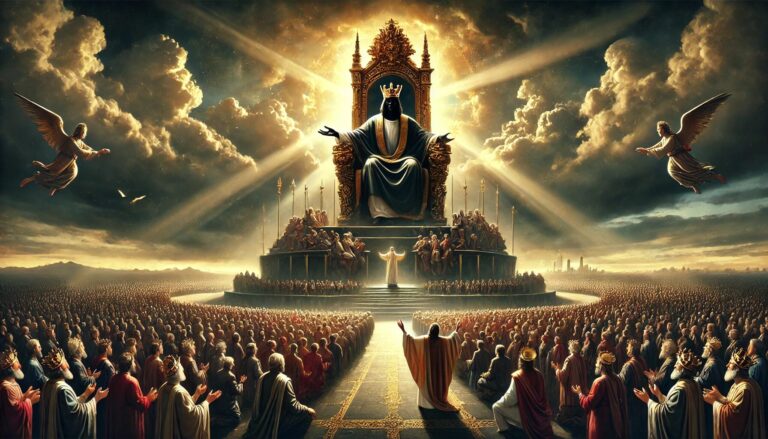If God is love, as stated in 1 John 4:8, and love entails self-sacrifice for the good of others, then how can a God who appears to be in pursuit of His own glory, willing even to decree His own creatures to damnation in order to be glorified, be understood as truly loving? If God is primarily concerned with His own glory, even at the expense and to the detriment of His creation, doesn’t that present a completely different image of God than the one portrayed in Jesus, who, rather than clinging to His own glory, emptied Himself and endured the cross for the salvation of humanity? If we are condemned for seeking our own glory, why is it righteous for God to do the same? I believe this paradox strikes at the heart of Calvinist theology and reveals a conception of God that appears more akin to a cosmic despot than the loving Father described in Scripture.
John Calvin himself was emphatic about God’s singular pursuit of his own glory. In his Institutes of the Christian Religion, he states, “We never truly glory in him unless we have utterly put off our own glory. Moreover, we must hold this as a universal principle: that no man is truly humbled unless he is first brought to a state of despair.” (Institutes, 3.12.6). Calvin makes it clear that human pride and ambition for glory are obstacles to genuine worship. The underlying assumption is that God alone is worthy of glory, and any attempt by man to seek his own honor is an affront to divine sovereignty.
Yet, this presents an ethical contradiction. If it is sinful for creatures to seek their own glory, how can it be virtuous for God to do so? Calvinists often respond by appealing to divine transcendence, stating that what is sin for man is not necessarily sin for God. However, this explanation feels inadequate, as it essentially asserts that God operates by an entirely different moral standard which makes appeals to his goodness incoherent. If God’s commands reflect his nature, and he commands humility and self-denial, then we must ask why his own nature must be defined by self-exaltation.
Moreover, Calvin’s doctrine of predestination intensifies this problem. If God’s primary purpose is his own glory, then the reprobation of the damned serves as a means to that end. In Institutes, Calvin insists, “The reprobate are raised up in order that through them God’s glory may be revealed” (Institutes, 3.23.6). This suggests that God’s glorification is, in part, achieved through the eternal suffering of the damned. But if love is the defining characteristic of God, as Scripture insists, then how can he derive glory from the torment of his own, image-bearing creatures? Does this not suggest a self-serving deity, more concerned with his own renown than with the well-being of his creation?
This dilemma becomes even more pronounced when we consider the biblical critique of self-glorification. Proverbs 25:27 warns, “It is not good to eat much honey, nor is it glorious to seek one’s own glory.” If self-glorification is morally suspect for creatures, how can it be the supreme end of the Creator? Some might argue that God, being the highest being, necessarily seeks his own glory because it is the highest good. But this raises a troubling implication: does God love himself more than he loves his creation? If his glory is the ultimate goal, then human beings become instruments rather than recipients of divine love.
Is God Lacking Glory?
Perhaps the most troubling implication of the Calvinist view is the notion that God’s ultimate purpose, whether in electing some individuals for eternal life or damning others to eternal destruction, is ultimately to satisfy His pursuit of glory. This raises a serious theological question: is God inherently full of glory, or does he require the constant exaltation of his creatures to sustain his glory?
I believe that a truly sovereign and all-sufficient God would not need to seek after glory, because He would already possess it in full. If God is truly infinite and perfect, then he cannot lack anything. This is precisely the doctrine of aseity, that God is self-existent and self-sufficient. He does not need anything from creation to be complete. The depiction of God in Calvinism as a megalomaniac presents Him as insecure, even weak—an omnipotent being who paradoxically must decree all things to satiate His desire for glory.
Contrast this with the biblical God, who does not need glory, but rather radiates it naturally.
If we are to understand what true divine glory looks like, we must turn to Jesus Christ, who is the “image of the invisible God” (Colossians 1:15) and the fullest revelation of the divine nature. Rather than exalting himself in raw power or through the subjugation of others, Christ revealed divine glory through self-emptying love.
Philippians 2:5-8 captures this paradox perfectly:
“Have this mind among yourselves, which is yours in Christ Jesus, who, though he was in the form of God, did not count equality with God a thing to be grasped, but emptied himself, by taking the form of a servant, being born in the likeness of men. And being found in human form, he humbled himself by becoming obedient to the point of death, even death on a cross.”
Christ emptied himself for the sake of others. He was born not in a palace but in a manger, surrounded by animals and the lowly shepherds of society. His life was marked not by self-aggrandizement but by servanthood, as he declared, “The Son of Man came not to be served but to serve, and to give his life as a ransom for many” (Matthew 20:28). If Jesus is the fullest revelation of God’s nature, then divine glory should not be understood as self-aggrandizement, but as self-giving love.
This is where Calvinist theology runs into its deepest contradiction. The God of Calvinism glorifies himself through power, sovereign will, and the subjugation of humanity—including, tragically, the damnation of the reprobate. But Jesus, who is the very image of God, does not glorify himself in this manner. His exaltation comes only after his humiliation. “Therefore God has highly exalted him and bestowed on him the name that is above every name” (Philippians 2:9). His glory is not in his domination, but in his self-sacrificial love. The Calvinistic view of God’s glory reframes the message of the Cross as something God endured primarily to secure His own glory, rather than the biblical truth that Jesus suffered and sacrificed Himself out of love for the world. In Scripture, Christ’s self-giving act is motivated by His deep love for humanity, not a self-serving pursuit of glory. While God is indeed glorified in the redemption of His creation, His ultimate purpose was not to seek glory but to offer Himself for the world He loves.
Conclusion
The Calvinist portrayal of God as one who demands exclusive glory while condemning human self-exaltation raises serious theological and moral concerns. If God’s character is truly righteous, then his pursuit of glory must be consistent with his commands to love, to serve, and to humble oneself.
A truly glorious God is not busy in a pursuit of glory because he already possesses it. Any theological system that portrays God as needing glory must be questioned, for it ultimately diminishes his sufficiency and turns him into an insecure, self-serving autocrat, rather than the infinite, self-sufficient, and loving God of Scripture.




